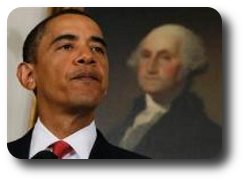Sunday 1 November, 1.45pm until 3.15pm, Henry Moore Gallery
 The election of Barack Obama in November 2008 represented to many Americans the promise of real political change. Amid war and economic recession, Obama’s historic inauguration in January drew millions to line the mall in Washington DC and stirred hope in the hearts of a nation.
The election of Barack Obama in November 2008 represented to many Americans the promise of real political change. Amid war and economic recession, Obama’s historic inauguration in January drew millions to line the mall in Washington DC and stirred hope in the hearts of a nation.
In the current political climate, such high expectations of a politician are rare. The jury is still out on whether Obama can deliver on the changes he promised. His economic stimulus package has been far from uncontentious and has hardly resolved America’s deep economic problems. Although his foreign policy has struck some conciliatory notes, with overtures towards Iran and the pressing of the ‘reset button’ with Russia, Afghanistan has now become Obama’s war. Back home, Obama’s post-racial stance has been questioned following his choice of Supreme Court candidate and his intervention in the “Gates-gate” fiasco. The president’s flagship policy of healthcare reform has not only met opposition from Republicans, but has also raised questions from Democrats wary of increasing the US budget deficit. Despite claiming on the campaign trail that ‘change comes to Washington’, after six months in office, Congress still has highly unfavourable ratings, even if Obama himself maintains the confidence of a majority of Americans.
One year after his election, has President Obama lived up to the hype? Does his administration really represent a new broom to sweep the cobwebs away – or now that the dust has settled – is there a return to politics as usual at the White House? In new circumstances, what would ‘politics as usual’ even mean? Has Obama set his sights too high… or not been ambitious enough?
 | James Crabtree comment editor, Financial Times |
 | Bronwen Maddox chief foreign commentator, The Times; author In Defence of America |
 | Professor Iwan Morgan head of US Presidency Centre, Institute for the Study of the Americas, University of London; author, The Age of Deficits |
 | Helen Searls senior executive producer, Feature Story News |
| Chair: | |

|
Dr Cheryl Hudson
lecturer in American history, University of Liverpool |
Republican candidate surges ahead in the polls, leaving the President facing the prospect of a heavy defeat in Virginia.
Christina Lamb, Sunday Times, 26 October 2009Barack Obama pledged to heal America’s divisions. Despite successes in a bruising first year, his promise of change remains unfulfilled, and his country as divided as ever.
James Crabtree, Prospect, 21 October 2009Giving Barack Obama the Nobel peace prize so early in his presidency could hinder rather than help his diplomatic efforts
Peter Beaumont, Guardian, 9 October 2009Even before Chicago was eliminated, critics had lampooned Barack Obama’s trip to Copenhagen as a misplaced exercise in “verbal gymnastics”. But Friday’s embarrassing first-round elimination is likely to cause Mr Obama more problems back home.
Edward Luce, Financial Times, 2 October 2009The predominant tone of opposition to the emerging Democratic health-care proposals, and to the President personally, came as a surprise to the White House and a profound shock to many who voted for Barack Obama last November.
Hendrik Hertzberg, New Yorker, 21 September 2009America is now engaged in a great debate about the future of health care, but we haven’t heard the voices of the millions of Americans who quietly struggle every day with a system that often works better for the health-insurance companies than it does for them.
Barack Obama, New York Times, 15 August 2009 Obama: the king of low expectations
Obama: the king of low expectations
Healthcare controversies, dumb comments about the arrest of a Harvard professor, and ‘frumpy jeans’: is Obama losing his Midas touch?
Sean Collins, spiked, 29 July 2009 Obama and the politics of abortion
Obama and the politics of abortion
The reaction to the president’s speech at Notre Dame shows how much the debate about abortion has shifted in the United States.
Helen Searls, spiked, 21 May 2009President Barack Obama marks his first 100 days in office, occasioning approximately 5,000 articles about this historic milestone event.
Christopher Buckley, Financial Times, 28 April 2009"The Battle of Ideas is adrenaline for the mind. A chance for intellectual fisticuffs with some of the best-known and most stimulating thinkers in the world."
Colin Blakemore, professor of neuroscience, Oxford University